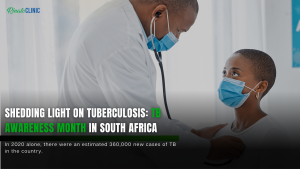March marks Tuberculosis (TB) Awareness Month in South Africa, a crucial period to highlight the impact of this infectious disease on the nation and encourage efforts towards prevention, treatment, and support. In this article, we will explore the current state of TB in South Africa, its challenges, and the ongoing initiatives to combat this public health issue.
The Burden of TB in South Africa:
South Africa faces a significant burden of tuberculosis, with one of the highest incidence rates globally. According to the World Health Organization (WHO), in 2020 alone, there were an estimated 360,000 new cases of TB in the country. The high prevalence of HIV/AIDS further complicates the situation, as individuals with compromised immune systems are more susceptible to TB infections.
Challenges in TB Control:
Several challenges contribute to the persistence of TB in South Africa. Poverty, overcrowded living conditions, and limited access to healthcare services are key factors that facilitate the spread of the disease. Additionally, the emergence of drug-resistant TB strains poses a serious threat, making treatment more complex and expensive.
Social Stigma:
TB is not only a medical issue but also a social one. Stigma and misconceptions surrounding the disease often hinder early detection and treatment. Many individuals may delay seeking medical help due to fear of discrimination or ostracization. Raising awareness about TB is crucial to dispel myths and reduce the stigma associated with the disease.
Government Initiatives and Partnerships:
The South African government, in collaboration with international organizations and NGOs, has implemented various initiatives to combat TB. These efforts include expanding access to testing and treatment, improving healthcare infrastructure, and promoting community-based interventions. However, continued advocacy and support are essential to sustain and enhance these initiatives.
Preventive Measures and Education:
Prevention remains a key aspect of TB control. Education about the importance of early detection, adherence to treatment regimens, and the significance of vaccination can contribute to reducing TB incidence. Public awareness campaigns, community outreach programs, and school-based initiatives are vital components of the broader strategy to curb the spread of the disease.
Tuberculosis remains a formidable public health challenge in South Africa, necessitating continued efforts to raise awareness, reduce stigma, and enhance healthcare infrastructure. As we observe Tuberculosis Awareness Month, let us unite in our commitment to eradicate TB and improve the health and well-being of all South
Africans. Together, we can create a future where TB is no longer a threat to our communities.
References:
World Health Organization. (2021). Global Tuberculosis Report 2020. https://www.who.int/teams/global–tuberculosis–programme/global–report-2020
Republic of South Africa. (2021). National Tuberculosis Management Guidelines 2021.https://www.health.gov.za/index.php/shortcodes/2015-03-29-10-42-47/2015-04-30-08-18-10/2021-01-20-10-56-55
Stop TB Partnership. (2021). South Africa Country Operational Plan 2021. https://www.stoptb.org/resources/publications.asp


